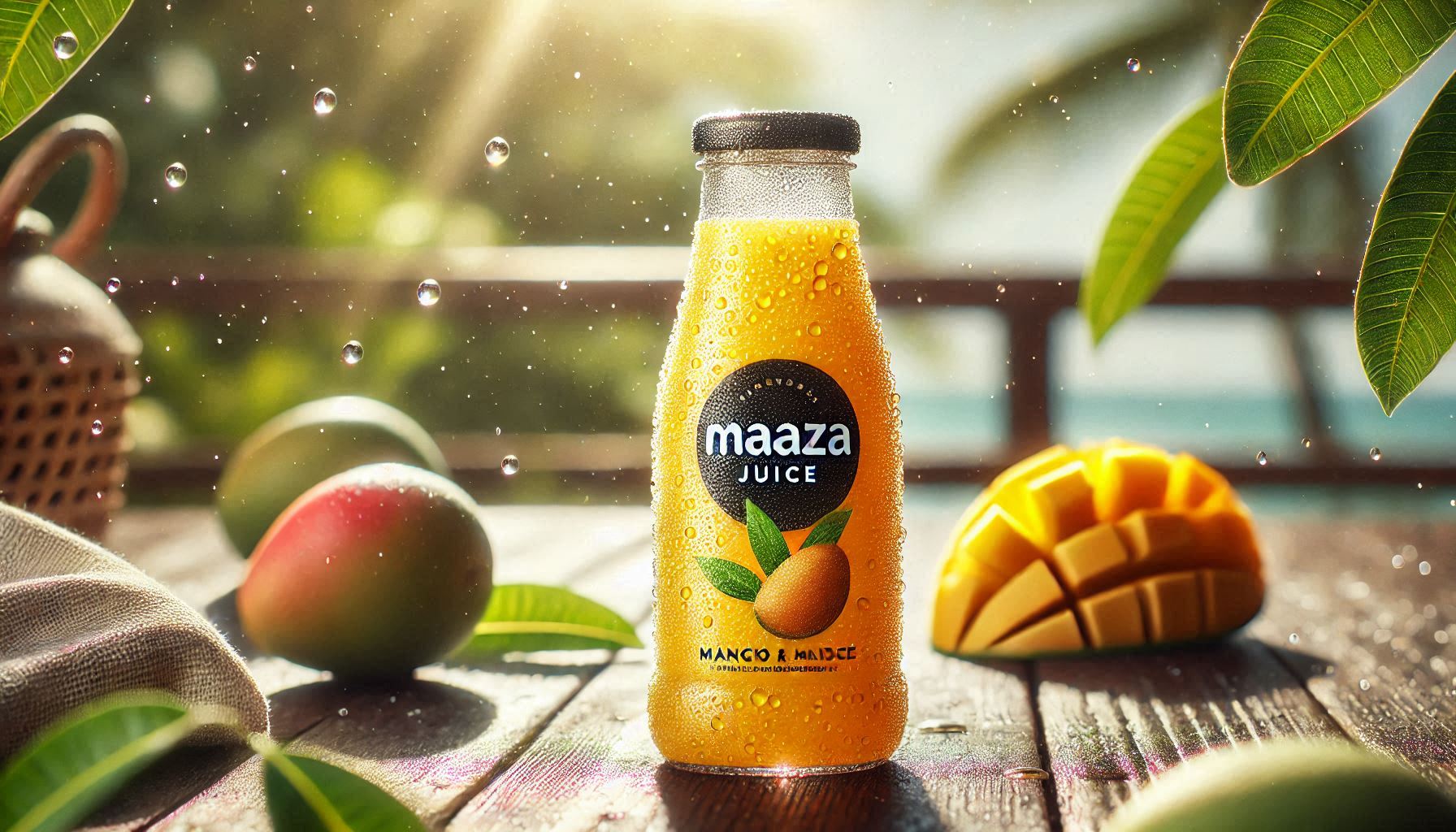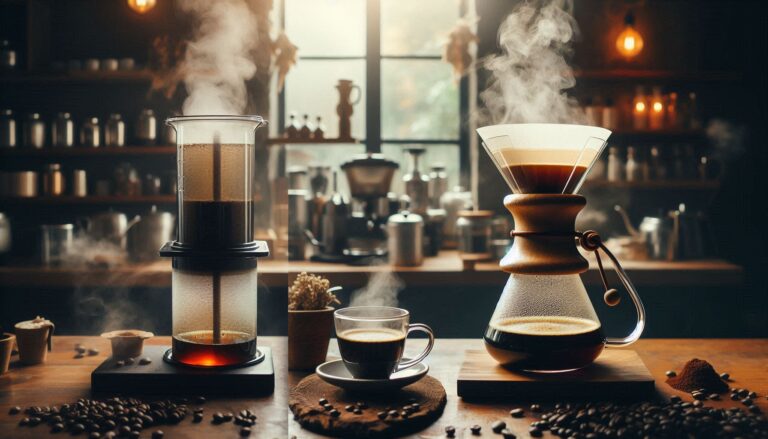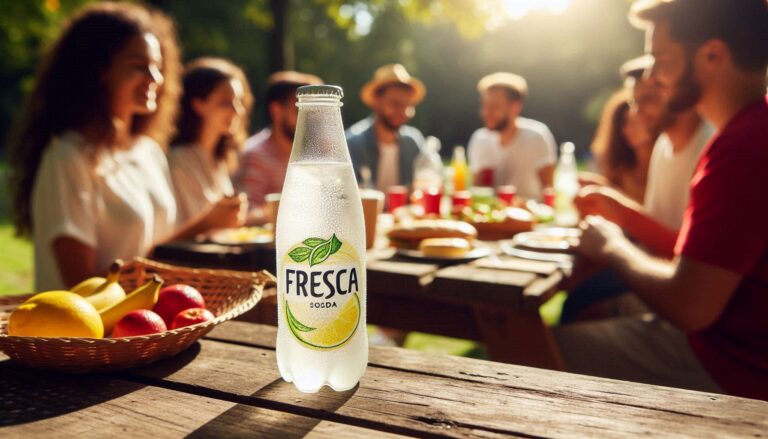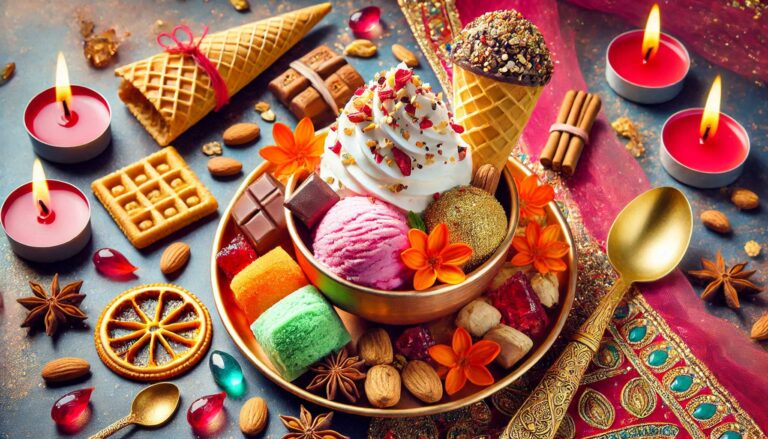Can We Drink Maaza in Fasting? Here’s What You Need to Know
Fasting is an essential spiritual practice in many cultures, especially within Hinduism, where it serves as a time of purification for both body and mind. While religious fasts come with strict dietary rules, modern-day products like Maaza, a popular mango drink, often raise questions. As a fruit-based beverage, Maaza might seem like a suitable option for fasting, but its ingredients might not fully align with traditional fasting practices.
So, the question arises: Can we drink Maaza while fasting? This blog will break down Maaza’s ingredients, the cultural and religious significance of fasting, and whether this mango drink fits into the fasting guidelines. Missteps during fasting can impact religious practices, making it crucial to determine whether certain foods or drinks are appropriate. Let’s explore the facts.
Can We Drink Maaza in Fast?
No, Maaza is generally not recommended during fasting. Although it’s a fruit-based drink, it contains preservatives, refined sugar, and artificial stabilizers that conflict with the principles of fasting. Fasting traditions emphasize fresh, natural, and unprocessed foods and drinks. Since Maaza is a processed beverage with additives, it doesn’t align with the purity and natural food requirements of strict fasts.
The Significance of Fasting in Hindu Culture

Fasting in Hinduism is not just a physical detox; it’s a spiritual journey. It’s seen as an opportunity to show devotion, clear the mind, and seek blessings. There are different types of fasts, each with its own set of dietary restrictions, but all emphasize purity, both in thought and consumption.
- Navratri: This is one of the most widely observed fasts, where participants refrain from grains, packaged foods, and processed drinks. The focus is on fruits, milk, and other fresh, natural foods.
- Ekadashi: Known for being a time of purification, this fast limits food to simple, unprocessed meals. Most fast participants consume fruits and water, avoiding grains.
- Karva Chauth: This fast allows liquids like coconut water, milk, and fruit juices, but only in moderation.
A key principle of fasting is adhering to Sattvic foods—pure, fresh, and natural items that are considered beneficial for both body and mind. Packaged or tamasic foods (those that are processed, stale, or artificial) go against the spirit of fasting.
What is Maaza?
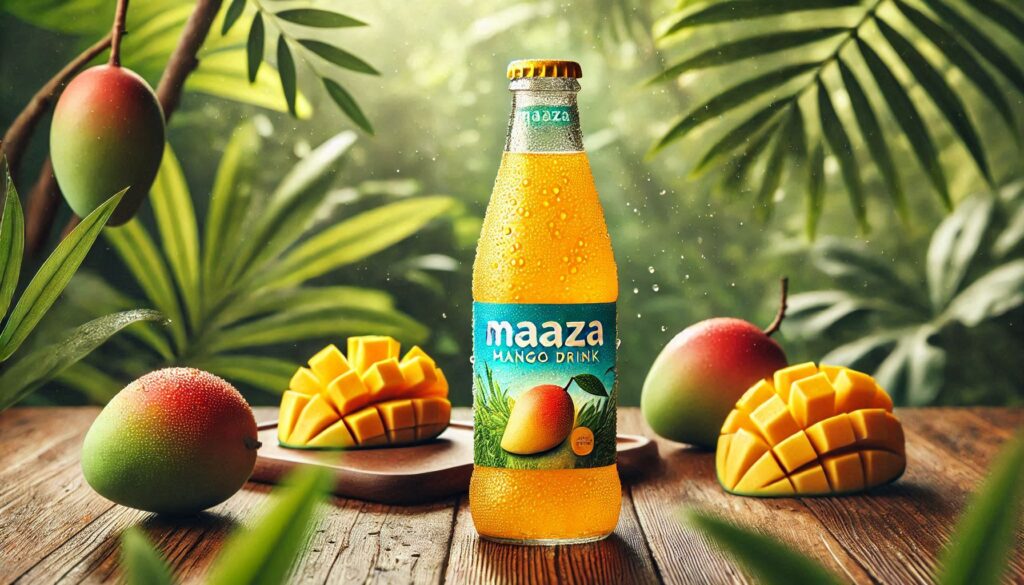
Maaza, a well-known mango-flavored drink from Coca-Cola, is marketed as a refreshing, fruit-based beverage. While it may seem like a natural alternative to fruit juices during a fast, let’s break down its ingredients.
- Mango Pulp (19-20%): This is the primary ingredient and gives Maaza its fruity flavor. It’s derived from real mangoes but is processed.
- Water: The base of the drink, ensuring the drinkable consistency.
- Sugar: Maaza contains refined white sugar, which could be problematic for those fasting strictly, as refined sugars are usually avoided.
- Citric Acid (E330): A preservative that helps maintain the drink’s shelf life but is a synthetic addition that doesn’t align with fasting ideals.
- Sodium Benzoate (E211): Another preservative used to prevent spoilage, which is also commonly avoided during fasting periods.
- Stabilizers (INS 440): These are artificial additives designed to maintain the texture and consistency of the drink.
Though Maaza claims to be fruit-based, the preservatives and artificial ingredients used in its production make it quite different from fresh fruit juices.
Fasting Rules and Packaged Drinks
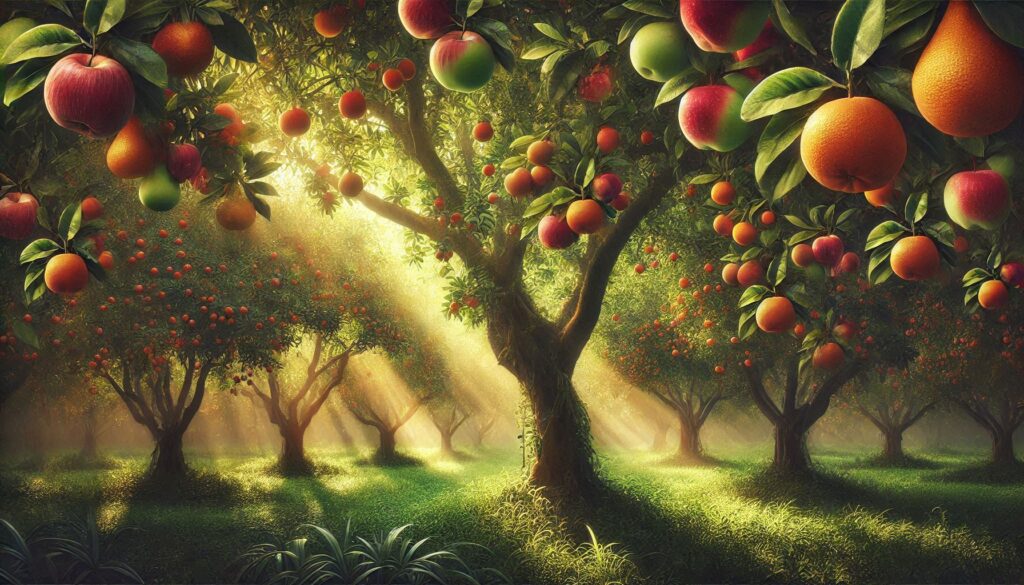
Traditional Hindu fasts emphasize consuming only fresh, unprocessed foods, meaning packaged drinks like Maaza are generally discouraged. While it’s tempting to opt for a fruit-based drink like Maaza, it’s important to remember that fresh options are typically preferred.
- Allowed Drinks: Fresh fruit juices, coconut water, milk, and sometimes buttermilk are considered acceptable during most fasts.
- Gray Area: While Maaza is fruit-based, it’s processed and contains additives that can be seen as contrary to the purity required during a fast.
- Family and Regional Variations: Depending on your household or region, some people might allow packaged juices, while others strictly avoid them. It’s essential to understand these variations when making decisions about fasting.
- Core Rule: To stay in line with fasting principles, choose natural, non-artificial drinks over processed options.
Can Maaza Be Considered a Fruit Substitute?

Maaza does contain mango pulp, which is a fruit, but that’s not the whole story. It’s important to compare Maaza to fresh fruit juice.
- Maaza’s Fruit Content: The drink has 19-20% mango pulp, which is a minimal amount compared to the whole fruit. Moreover, it contains sugar, preservatives, and artificial stabilizers that are absent in fresh fruit juice.
- Nutritional Comparison: Fresh mango juice is naturally high in vitamins, minerals, and enzymes, while Maaza’s added sugar and preservatives make it far less nutritious. Fresh fruit offers hydration and natural energy, while Maaza mainly provides sugary refreshment.
- Fasting Spirit: Fasting aims to detoxify the body and mind. Fresh fruit aligns with this goal, while a processed drink like Maaza can hinder the purifying process.
- Practical Choice: Many choose Maaza for convenience, but it doesn’t truly replace fresh fruit, especially during a fast where purity is paramount.
Ingredient Analysis – Do They Break the Fast?

Now, let’s take a closer look at the key ingredients of Maaza to see if they break fasting rules.
- Mango Pulp (Allowed): Mango pulp is derived from real fruit, so it aligns with fasting principles. However, it is processed in Maaza, which reduces its purity.
- Sugar (Questionable): Refined sugar is typically avoided during fasting since it doesn’t come from natural sources like fruits. Fasting is about consuming foods that are as close to their natural form as possible, so refined sugar may be problematic.
- Citric Acid (Avoided): This is an artificial preservative that doesn’t fit the natural food ethos of fasting. It’s usually avoided by those observing strict fasting rules.
- Sodium Benzoate (Uncertain): Another preservative that is synthetically added to extend the shelf life of Maaza. It doesn’t align with the natural food focus of fasting.
- Stabilizers (Uncertain): These are artificial additives that maintain Maaza’s texture. They don’t conform to the pureness expected during fasting.
In conclusion, the artificial preservatives and refined sugar in Maaza make it unsuitable for stricter fasts, breaking the natural-food guideline.
Practical Scenarios – When People Consider Drinking Maaza
In some situations, people may still opt to drink Maaza despite the fasting restrictions. Here are a few common scenarios:
- Convenience Over Rules: When traveling or working during a fast, individuals may opt for Maaza for hydration as it’s easy to carry and drink.
- Family Gatherings: In certain households, Maaza may be accepted during fasting, reflecting the individual or family’s traditions.
- Emergency Situations: Sometimes, fresh fruits or drinks might not be available, leading to Maaza being used as a last resort.
- Occasional Relaxation: Some people relax their fasting rules occasionally, allowing small deviations like consuming Maaza in moderation.
Expert Opinions and Religious Views
Religious and spiritual leaders tend to recommend avoiding packaged drinks like Maaza during fasting periods to maintain the purity of the practice. They emphasize choosing natural, unprocessed foods to align with fasting principles.
- Religious Leaders’ Views: Most agree that packaged juices, including Maaza, should be avoided to preserve the sacredness of fasting.
- Community Practices: While some households allow Maaza, it’s generally seen as a gray area. People might allow it for convenience, but it’s not the most ideal option.
- Ayurvedic Insight: Ayurveda, which promotes sattvic foods during fasting, advises against the consumption of processed drinks like Maaza.
Alternatives to Maaza During Fasting

you’re seeking alternatives to Maaza during your fast, here are some excellent options:
- Fresh Mango Juice: Freshly squeezed mango juice is the best option, providing purity and natural sweetness.
- Coconut Water: Naturally hydrating and refreshing, coconut water is an excellent choice during fasting.
- Herbal Drinks: Herbal infusions like jeera water or tulsi water are also great fasting options.
- 100% Fruit Juices: Some packaged juices with no preservatives can be a safe option, but always read labels carefully.
- Lassi or Buttermilk: These are nutritious and filling, making them great options during fasts.
For more about fasting-friendly drinks, check out our post on Can We Drink Frooti in Navratri Fast? where we explore similar queries related to other drinks during fasting.
Conclusion
While Maaza may be a tempting option, its preservatives and refined sugar content make it unsuitable for strict fasting. Instead, opt for natural, fresh alternatives like coconut water or fresh fruit juices that align with fasting principles. Ultimately, respecting your personal or family fasting practices is essential, but sticking to natural, sattvic foods will always be the best choice.
FAQ
1. Is Maaza a healthy option to drink during a fast?
Maaza contains preservatives and refined sugar, which are not ideal for fasting where pure and natural ingredients are preferred.
2. Can I consume Maaza during intermittent fasting?
Intermittent fasting generally allows for a broader range of drinks, but Maaza may still not be suitable due to its sugar content and preservatives.
3. How does Maaza compare to fresh fruit juices when fasting?
Fresh fruit juices are preferred during fasting as they are natural and unprocessed, unlike Maaza which contains additives.
4. Is Maaza allowed during a religious fast like Ekadashi or Karva Chauth?
Maaza may not be allowed during strict religious fasts like Ekadashi or Karva Chauth, which emphasize natural and pure foods and liquids.
5. Does Maaza contain any natural mango juice?
Maaza contains mango pulp but is mixed with sugar and preservatives, making it less natural compared to freshly prepared mango juice.
6. Can I drink Maaza if I’m fasting for detox?
For detox purposes, it is better to avoid Maaza as it contains processed ingredients that do not contribute to the detoxifying effect of fasting.
7. Does Maaza contain artificial preservatives?
Yes, Maaza contains preservatives like sodium benzoate and citric acid, which are often avoided during fasting to maintain purity.
8. What are the drawbacks of drinking Maaza during a fast?
The main drawbacks include the refined sugar, preservatives, and artificial stabilizers, which do not align with fasting principles.
9. Can Maaza be considered a fruit-based drink during fasting?
While Maaza has mango pulp, it also contains additives, which makes it less suitable as a pure fruit drink during fasting.
10. Is Maaza a tamasic food, and can it break the fast?
Yes, Maaza is considered tamasic due to its artificial ingredients, which may break a fast depending on the fasting rules followed.
11. Can Maaza be consumed in moderation during fasting?
While some people may tolerate Maaza in moderation, it generally doesn’t align with the purity of fasting, especially during religious or spiritual fasts.
12. What alternatives to Maaza are better suited for fasting?
Alternatives like coconut water, fresh fruit juices, and herbal teas are better suited for fasting as they are natural and free from preservatives.
13. Does Maaza provide hydration during fasting?
Maaza provides hydration but isn’t the best choice due to its high sugar content and artificial additives, which are avoided in fasting.
14. Can I drink Maaza if I’m fasting but need energy?
Maaza can give a quick sugar boost but doesn’t provide the natural energy benefits of fresh fruit or coconut water, which are preferable during fasting.
15. How does Maaza’s sugar content affect fasting?
The refined sugar in Maaza could be counterproductive to fasting, which typically favors natural sugars from fruits for sustained energy.
16. Can I drink Maaza if I’m fasting for religious purposes?
It depends on personal or family fasting rules, but most religious fasting traditions avoid drinks like Maaza due to its artificial ingredients.
17. Does Maaza contain any nutritional value for someone fasting?
Maaza has little nutritional value beyond sugar and artificial ingredients, making it unsuitable for those fasting with health or spiritual goals in mind.
18. Can Maaza be part of a non-strict fast or casual fast?
While non-strict fasting may allow more flexibility, Maaza is still not recommended due to its high sugar content and preservatives.
19. Is Maaza allowed in regional fasting traditions?
Regional fasting practices may vary, but many discourage the consumption of processed drinks like Maaza, preferring natural and fresh options instead.
20. Can Maaza be used as a quick replacement for fresh fruits during a fast?
While Maaza may serve as a quick substitute, it doesn’t offer the natural purity and nutritional benefits of fresh fruits, making it less suitable for fasting.
